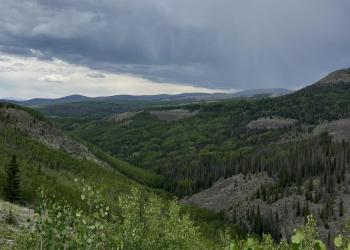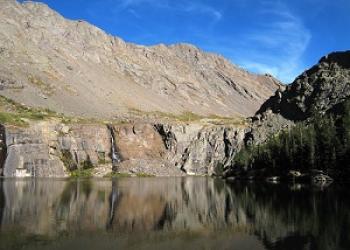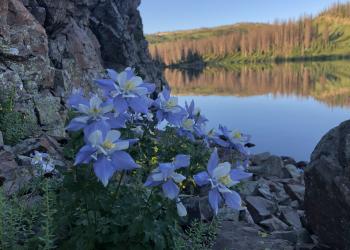Wilderness
Wilderness is defined as a portion of land set aside by the 1964 Congressional Wilderness Act that will remain unspoiled for future generations. The Wilderness Act gave the U.S. Forest Service a mandate to manage these special lands so they would be "an enduring resource," one that would remain "unimpaired for future use and enjoyment as wilderness."
In contrast with those areas where man and his own works dominate that landscape, a wilderness is recognized as an area "...where the earth and its community of life are untrammeled by man, where man himself is a visitor who does not remain." Wilderness areas are generally over 5,000 acres in size and may contain ecological, geological, or other features of scientific, educational, scenic, or historical value.
Please view the special regulations associated with Wilderness and always use Leave No Trace techniques to help keep these areas wild, clean, and pristine.
The Rio Grande National Forest manages four Wilderness areas.
La Garita Wilderness

Shared with the Gunnison National Forest, the La Garita Wilderness Area was initially designated in the 1964 Wilderness Act. La Garita means "the lookout" in Spanish, and this Wilderness amply deserves the name. From the summit of this Wilderness's single fourteener, San Luis Peak (14,014'), climbers can gaze across the upper Rio Grande Valley and down the long stretch of the San Luis Valley.
Sangre de Cristo Wilderness

Spanning both the Rio Grande and San Isabel National Forests, the 220,803 acre Sangre de Cristo Wilderness was designated by congress in 1993. All of this wilderness is located in Colorado and is managed by the Forest Service and the National Park Service. The Sangre de Cristo Wilderness consists of a bordering arc around the Great Sand Dunes National Park & Preserve.
South San Juan Wilderness

Managed by both the Rio Grande and San Juan National Forests, the South San Juan Wilderness encompasses the southeastern extent of the San Juan Mountain Range, including a segment of the Continental Divide. Originally designated as wilderness by Congress in 1980, it is a component of the National Wilderness Preservation System and now maintains 158,790 acres.
Weminuche Wilderness

At three quarters the size of Rhode Island, the Weminuche Wilderness is the largest Wilderness area in Colorado at 499,771 acres. The Weminuche was designated by Congress in 1975, and expanded by the Colorado Wilderness Acts of 1980 and 1993. The Rio Grande and San Juan National Forests share management of this wilderness area.
Wildfires in Wilderness Areas
Wildfires will occasionally occur in wilderness areas. It's not a matter of if, but when. When they do occur, the Rio Grande National Forest may choose to employ a modified suppression technique where all or parts of the fire may not be immediately extinguished. To allow a wildfire to play it's natural role in a wilderness area is consistent with the intent of the Wilderness Act.
For information on Fire Management on the Rio Grande, please visit our Fire Main page. From there, you can learn about management strategies, fire prevention (including fire restrictions), and fire information.



